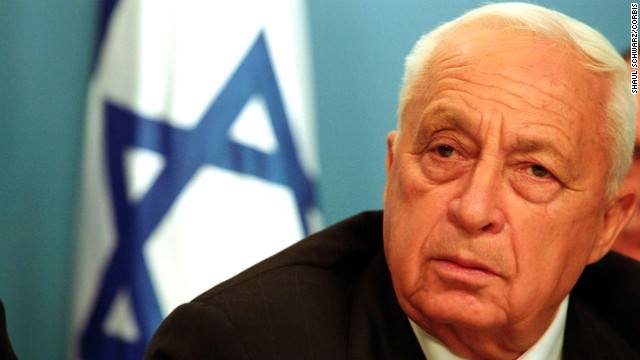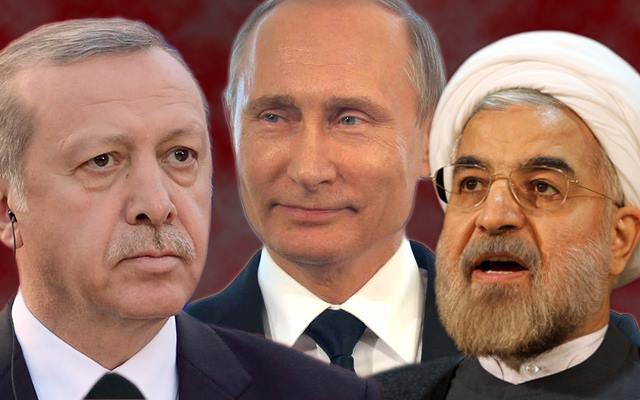"Return to Ariel Sharon". Interview with Daniel Pipes
By
Posted on December 22, 2016
On December 14, Commentary published the latest article by Daniel Pipes on the Arab-Israeli conflict, "A new strategy for the victory of Israel" which, by concession of its author, was translated and published for Italy by L Informal .
The article is a real manifestation for a new approach to what is the most enduring conflict from the end of World War II to today. This is a linear analysis which is right in the middle of the matter. Daniel Pipes, interviewed by us in September, has again agreed to give us an exclusive interview.
Professor Pipes, I would start with his main allegation of Israeli Palestinian negotiations. It would be a vicious circle that does not perpetuate itself, a kind of madness. Is that so?
I've been a bit poetic in the opening paragraph of my article referring to madness, even though Israeli-Palestinian diplomatic efforts repeat the same pattern indefinitely. Israelis make concessions to Palestinians who respond with incitement so that violence increases until then the Israelis make other concessions and the process repeats.
In your article you present the Oslo Accords of 1993 as a fundamental mistake on the part of Israel. What were the main reasons for this wrong approach?
The urge to end the conflict, although the other party was not ready to do so, followed by the persistent blindness of what the Palestinians did.
One of the most desirable features of her analysis is that she does not see an exit from the Arab-Israeli swamp except through Israel's full assumption of her military strength. Is that so?
Not exactly. When I refer to a victory of Israel, I'm not saying it should be primarily military. It is a mixture of military strength, political will, brilliant vigilance, energetic diplomacy and more. Ariel Sharon followed this political approach from 2001 to 2003.
As I read his article, I warned of the shadow of Carl von Clausewitz and that of Thomas Hobbes, two realistic and empirical resolutions who have always called things by their name. How much has been influenced by them?
He's right. I spent two years teaching Clausewitz at the American Naval College, and this experience had an effect on me. As much as Hobbes did not have so much influenced me as other British political thinkers.
His invitation to Israel to be victorious, resolute and even ruthless, is precisely opposed to what most of the world and a large part of Israeli public opinion wants to do. You seem to say, "Do not worry if this will worsen your reputation because the purpose to reach is more important." And so?
It's part of it. I note that when the Israeli government takes the weak passages that "much of the world" loves, how to retreat from Lebanon and Gaza, the benevolence lasts for a week or so and then anti-nationalism increases. Conversely, when Jerusalem is resolved, as in the raid in Entebbe, it gains popularity and respect. So, while the pursuit of victory, in the face of public relations, may have a price to pay in the short term, I believe that in the long run will benefit Israel.
The alliance with the United States is central to Israel. Many analysts believe that the Obama administration was the least friendly to Israel, is she also of this opinion?
No. Eisenhower was much less friendly than Obama. Obama holds a mixed primacy over Israel. Not as favorable as his supporters say or as negative as his critics attribute. He gave the best on arms transfers and the worst in maintaining a respectful relationship with Netanyahu.
What does the Trump Administration expect from the Jewish state and the Middle East in general?
It can not be predicted. Trump is not a systematic thinker, but a person who responds intuitively to the circumstances. His Secretary of State has no foreign policy experience, and his Defense Minister and National Security Adviser give the impression that he is a contradictory man.
Moving the United States embassy from Tel Aviv to Jerusalem is a good idea or falls under Joseph Fouché's argument that "more than a crime is a mistake"?
No, Fouché's Failure does not apply in this case. It is the right thing to do, but I doubt that the transfer will take place unless it is in the context of wanting to encourage an Israeli victory, otherwise it is not worth the trouble that Washington should take the trouble to catch up.
What is your opinion about the appointment of General James Mattis to the new Minister of Defense in relation to what has been said in the past, that Israeli settlements are going in the direction of turning Israel into a state where apartheid is being practiced?
Mattis was the commander of the CentCom and in that role came into contact with many enemies of Israel who influenced him. Maybe it will support the views already expressed, maybe they will abandon it. I can not predict it.
About the alliance between Putin, Rouhani and Erdoğan, and the renewed role of Russia in the Middle East, how Israel and the United States are influenced by the union of three autocrats who despise liberal values and democracy but present themselves to the " vanguard against Islamic extremism?
I doubt these three leaders can earn much from an alliance because the tensions between them are so dense that they can almost be touched. The idea that two Islamists like Rouhani and Erdoğan fight Islamic extremism is a fun way to end the interview.
This post is also available in: English ( English )




BEN-GURION’S DECLARATION ON THE EXCLUSIVE AND INALIENABLE JEWISH RIGHT TO THE WHOLE OF
ReplyDeleteTHE LAND OF ISRAEL:
at the Basle Session of the 20th Zionist Congress at Zurich(1937)
(David Ben-Gurion was the first Prime Minister of Israel and widely hailed as the State's main founder).
No Jew has the right to yield the rights of the Jewish People in Israel -
David Ben Gurion
(David Ben-Gurion was the first Prime Minister of Israel and widely hailed as the State's main founder).
"No Jew has the right to yield the rights of the Jewish People in Israel.
No Jew has the authority to do so.
No Jewish body has the authority to do so.
Not even the entire Jewish People alive today has the right to yield any part of Israel.
It is the right of the Jewish People over the generations, a right that under no conditions can be cancelled.
Even if Jews during a specific period proclaim they are relinquishing this right, they have neither the power nor the authority to deny it to future generations.
No concession of this type is binding or obligates the Jewish People. Our right to the country - the entire country - exists as an eternal right, and we shall not yield this historic right until its full and complete redemption is realized."
(David Ben Gurion, Zionist Congress, Basel, Switzerland, 1937).
"No country in the world exists today by virtue of its 'right'.
All countries exist today by virtue of their ability to defend themselves against those who seek their destruction